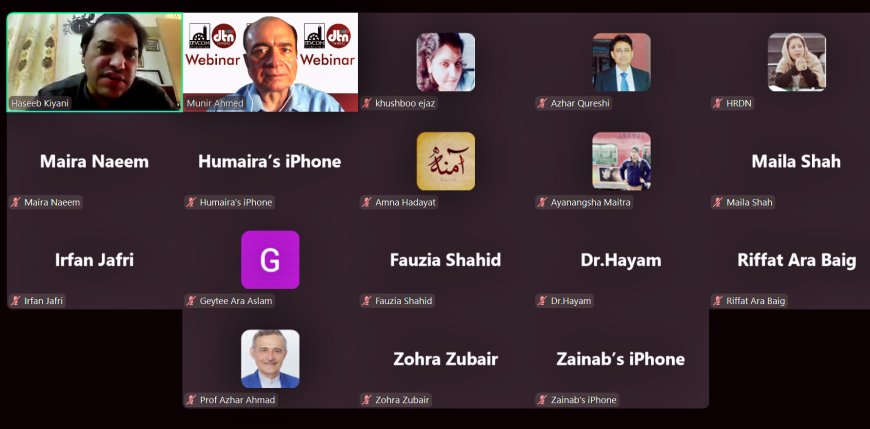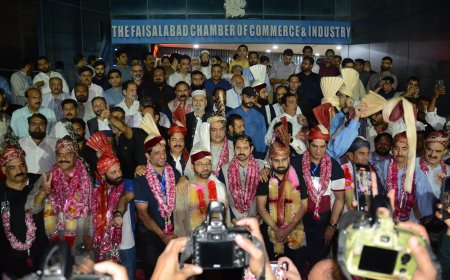Shrinking Spaces for Civil Society Cause Frustration, Brain Drain - FNNI
Islamabad (FNNI) Civil society representatives and concerned citizens at the Devcom-Pakistan Open Public Forum underscored the urgent need for collaborative efforts to address the shrinking spaces for civil society in Pakistan. Participants emphasized the need for enhanced collective advocacy to reform restrictive regulations impacting civil society. Building alliances with business groups, academics, and international organizations was highlighted as crucial for advancing policy changes that support greater freedom for CSOs.

Islamabad (FNNI) Civil society representatives and concerned citizens at the Devcom-Pakistan Open Public Forum underscored the urgent need for collaborative efforts to address the shrinking spaces for civil society in Pakistan. Participants emphasized the need for enhanced collective advocacy to reform restrictive regulations impacting civil society. Building alliances with business groups, academics, and international organizations was highlighted as crucial for advancing policy changes that support greater freedom for CSOs.
They said the social development sector has shrunk to the historic low because of undue regulatory frameworks, and lack of donors’ trust in the nongovernmental sector. Instead of engaging civil society to counter anti-state propaganda and to support development, many restrictions were imposed on them. The forum underscored the importance of working with legal experts to challenge and seek reforms for laws that severely restrict CSO activities, such as those related to registration, foreign funding, and operational constraints.
The forum encouraged engaging with international organizations and networks to gain support and advocacy for a more favorable environment for CSOs. Participating in global dialogues and forums was also suggested to share experiences and influence international policy.

Devcom-Pakistan, a leading development organization, hosted the Open Public Forum on Saturday to address the pressing issue of shrinking spaces for civil society in Pakistan. The forum brought together key stakeholders, including civil society organizations (CSOs), policymakers, digital experts, and community leaders, to discuss the challenges faced by CSOs and propose actionable recommendations for fostering a more enabling environment.
The guest speakers included Human Resource Development Network Executive Director Robeela Bangash, PakAID chief Executive Haseeb Kiyani, Kinnaird College associate professor Dr. Khushboo Ejaz, Bahria University faculty member Dr. Hayyam Qayyum, Devcom-Pakistan Executive Director Munir Ahmed, and ECI executive Director Azhar Qureshi.
HRDN Executive Director Robeela Bangash said undue regulatory frameworks, political instability, inconsistency of policies, and the negative perception about the nongovernmental sector marred the spaces, and undervalue their work in the development of communities. The CSOs need to change the sector’s perception as well as need to harness public-private partnerships. They can better navigate regulatory constraints, overcome digital barriers, and continue to drive positive societal change.
Devcom-Pakistan Executive Director Munir Ahmed highlighted the importance of building local partnerships and mobilizing community volunteers to support CSO activities and advocacy efforts. We need to rationalize our freedom of expression that most of the time crosses the redlines because of vested and political interests, and camouflaged narratives. He also suggested comprehensive training for CSO staff and volunteers on navigating regulatory environments and enhancing digital security was emphasized. Building skills in advocacy and legal literacy was also considered vital. Transparency and merit could change the negative perception of civil society organizations.
PAKAID chief executive suggested to change the work behavior and patterns to seek partnerships and funding. Most of the funding is available with the government projects that shall engage the nongovernmental sector to reach out the communities. He recommended diversifying funding sources and strengthening organizational management practices to enhance adaptability and efficiency in the face of regulatory and operational challenges.
Meanwhile, the Human Rights Commission of Pakistan (HRCP) has welcomed the Lahore High Court's ruling, under which the federal government's 2022 policy - requiring NGOs to register with the Economic Affairs Division if receiving foreign funds - has been declared unlawful because it lacks legal cover. The writ petition was filed earlier in February by HRCP on the grounds that such policies violate NGOs' right to association.
This policy was framed some months after its 2013 precursor was declared invalid by the Sindh High Court in February 2022. This is a key decision for civil society organizations and for civic spaces in general. Many NGOs' operations have been curtailed by what is an intrusive policy imposing onerous requirements and giving security agencies the authority to arbitrarily deny organizations clearance.
It is also worth pointing out that the State Bank of Pakistan, in its response to the petition, clarified that it had not instructed banks to withhold NGOs’ funds if they were not registered with the EAD.
The federal cabinet has notified the formation of a committee to review foreign funding received by both international and domestic nongovernmental organisations (NGOs), it emerged on Wednesday. The committee will “review the channels through which NGOs receive foreign funding, suggesting concrete measures to ensure transparency and visible funding trails," the notification read. The committee will also ensure that any funding received by NGOs will be “utilised for the purpose for which they have been received”.
What's Your Reaction?






































